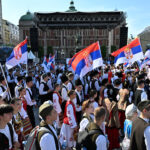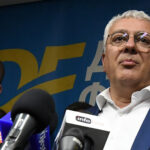- A new government has been approved in North Macedonia
On June 23, North Macedonia’s parliament voted for a new government led by Prime Minister Hristijan Mickoski, VMRO-DPMNE leader that won the election.
Mickoski emphasized that the government would continue to support European integration and would work to harmonize policies with European standards, advocating for moving the European integration process forward.
“We continue to work along with our European partners and together we will harmonize the common foreign policy with the EU. Support to Ukraine in self-defense and protection of its sovereignty and territorial integrity will continue,” he emphasized.
In his swearing-in oath, the leader of VMRO-DPMNE used the country’s constitutional name – the Republic of North Macedonia. “I say that this designation, which I have to state during my swearing-in, is shameful, as it reminds me personally of the shame you have brought to my country, my family and my unborn grandchildren and those who will come after them. And as long as I live, both politically and as a person, I will do everything in my power to right this injustice. Unfortunately, I am powerless at this moment, as a human being, I will be forced to surrender to you,” Mickoski said in parliament.
He also announced that he would not allow the compromises demanded by Sofia from Skopje (in particular, to recognise the Bulgarians as a state-building people in the Constitution of North Macedonia). “Such a Bulgarian diktat under such circumstances while I am a Prime Minister will not pass and there will be no constitutional changes,” Mickoski emphasized.
Given the position of the new Macedonian government, further Bulgaria’s blocking North Macedonia’s European integration can be expected.
- Serbia supplies weapons to Ukraine through third countries
Estimates provided by the Financial Times indicate that since the beginning of Russia’s full-scale invasion of Ukraine in 2022, Serbian exports of ammunition that have entered Ukraine through third parties have amounted to around 800 million euros.
“Yes, we do export our ammunition. We cannot export to Ukraine or to Russia … but we have had many contracts with Americans, Spaniards, Czechs, others. What they do with that in the end is their job,” said Serbian President Aleksandar Vučić in an interview with the FT. At the same time, Vučić emphasized that Serbia did not take any side in the war between Russia and Ukraine, and the sale of ammunition is “a part of our economic revival”.
Russian and Serbian pro-Kremlin experts have called the FT’s publication a “provocation”, the purpose of which is to create distrust between Moscow and Belgrade, to provoke tension in bilateral relations.
The official Kremlin did not react sharply to the FT article, warning that Russia would investigate the data on Belgrade’s arms supplies to Kyiv. The Kremlin’s spokesman Dmitriy Peskov stated this on June 24.
- Vučić predicts the aggravation of the geopolitical crisis in the coming months
Serbian President Aleksandar Vučić believes that the world is living in the time of the biggest geopolitical crisis since World War II and that the situation would escalate in the coming months.
“I expect the situation to escalate in the coming months and that we will face very serious consequences, I am talking about Europe and the world,” Vučić said, addressing the public on the evening of June 24. In particular, he expects major disruptions in the market – from energy products to food, not only in Serbia, but also in the whole world. “But we must be firmly determined to do our job in the best possible way, to preserve peace, to ensure economic growth,” the Serbian president added.
As he stated, in the first quarter, Serbia had the highest growth rate in Europe at 4.7 percent.
During his address, Vučić talked about several economic projects, in particular, about the production of a new car model at the Kragujevac factory together with an Italian company, about lithium mining plans, about the possibility of building small modular nuclear reactors, and preparations for the World Expo EXPO – 2027, which will be held in Belgrade. In his opinion, EXPO is a key and turning point for the development of Serbia.
***
It is obvious that, giving global upheavals and challenges in the life of official Belgrade, the Serbian President is trying to focus people’s attention on the more favorable topic of economic growth.
- Power outrage in the Western Balkans due to the heat
Several hours power outage hit Montenegro, part of Croatia, Bosnia and Herzegovina and Albania on June 21 as heat overloaded the regional power transmission system.
In Montenegro, a fire was reported on a high-voltage power line in a remote area near the border with Bosnia and Herzegovina. It is unknown whether this could have caused the system failure. The failure occurred at the interconnector between Albania and Greece, which could have produced a domino effect in the region’s power systems.
A day after the blackout, the energy supply in all four countries was resumed, but one thermal power plant in Bosnia and Herzegovina is still not working.
According to the Ministry of Energy of Montenegro, the shutdown was caused by a sudden increase in power consumption brought on by high temperatures, overloading the system itself.
- The court of Montenegro will consider the “coup d’état” case again
The Special Prosecutor’s Office of Montenegro actually confirmed the previous first-instance verdict and suggested the Court to impose various prison terms on the organizers of the coup d’état in Montenegro in 2016.
The Court of Montenegro has already issued a decision on the “coup d’état” case, confirming the then-indictment of the Special Prosecutor’s Office.
A 2019 Montenegrin court found two Russians (agents of the Russian special services), Serbs and Montenegrins guilty of attemping to organize a criminal organization, to overthrow the government and to announce the victory of the pro-Russian Democratic Front in the 2016 parliamentary elections in order to prevent Montenegro from joining NATO. On the election day on October 16, 2016, the attackers planned to seize the Montenegrin parliament by force, as well as kidnap and kill the then Prime Minister of Montenegro Milo Đukanović.
In 2021, the Court of Appeal of Montenegro overturned the first-instance verdict due to “significant violations of criminal procedure”. The verdict was issued after the change of power in the country and the entry into the government coalition of representatives of the Democratic Front, involved in the coup d’état case.
In the updated Prosecutor’s Office’s indictment, some wording has been changed, but the legal qualification of criminal acts has remained unchanged.
The Court will announce a new verdict on July 12.
Among those accused is the speaker of the Parliament of Montenegro Andrija Mandić, who in 2016 was one of the leaders of the Democratic Front.
- The court of Kosovo ruled in the case of the attack on KFOR last May
A court in Priština sentenced Serb Nenad Orlovic to 15 months in prison and a fine of 12,000 euros, finding him guilty of attacking on Kosovo Force (NATO KFOR) peacekeepers. The court’s sentence took effect immediately because it was the result of a plea deal.
The attack by local Serbs on KFOR members took place in May of last year in the north of Kosovo, in Zveçan. As a result of the clashes, about 93 NATO peacekeepers were seriously injured.
The attack on KFOR came after Kosovo police helped the new Albanian mayors enter municipal buildings, which was opposed by the local Serb population, which did not recognize the results of the local elections, boycotting it.
A year later, the NATO mission in Kosovo appealed to bring to justice those responsible for the attack on KFOR during the protest in Zveçan. NATO leadership repeatedly reminded of the need to punish the attackers.



